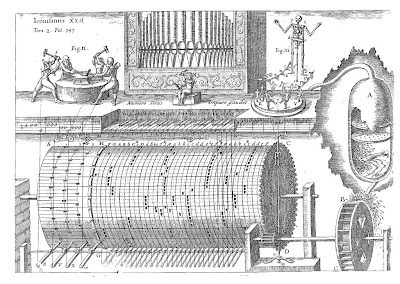"Prithee", quoth Another Kiwi, "let us hie to the Old Entomologist, there to partake of amber fluids and discourse of lofty issues."
"Such as?" I asked.
"Such as whether Te Papa was right to spend $1.5M on a red-painted, refigured concert piano."
The provocation for this veritable pith-up of quothing was a glance at the recent Riddled Search Terms. The list provides a salutary reminder (also minatory, and indeed hortatory) that readers are drawn to Riddled not just for the scientific knowledge that we dispense with such generosity; they also flock to learn from our views about culture.
Sadly, after three pints each of the Gumdigger Old Dalmatian (contains actual amber!) we had still not reached consensus as to the value of the purchase, or whether the piano would ideally be well-tempered or tuned in just intonation.
Instead we somehow allowed ourselves to be side-tracked onto the topic of Player Pianos as a theme in post-war literature.* Why is it, we asked ourselves, that only automated keyboard instruments have the metonym monopoly?** Why does no-one write novels called "Drum Machine" or "Serinette" when they want to express their anxieties about human redundancy and depersonalisation and the death of creativity in an increasingly automated, alienated economy? Is that fair? IS IT BOGROLL.
It was a matter of moments to find the paper napkins (head barmaid Evangeline van Holsterin doesn't hide them very well) and start designing the self-playing programmable cello. Later Evangeline threw us out for what she describes as "unbecoming conduct with the juke-box". We've been band!
 Here Gustav Wolpertiger is inventing the Automatic Clockwork Bagpipes in 1822. Sadly, it never had the same social impact as the player piano, partly because the prototype was sabotaged by disgruntled Luddite pipers who replaced the tapes with their own vandalised version, and partly because no-one could tell the difference.
Here Gustav Wolpertiger is inventing the Automatic Clockwork Bagpipes in 1822. Sadly, it never had the same social impact as the player piano, partly because the prototype was sabotaged by disgruntled Luddite pipers who replaced the tapes with their own vandalised version, and partly because no-one could tell the difference.Below: Research by Athanasius Kircher along similar lines resulted in the invention of the automated barrel-driven dentures [includes supplementary skeleton].
Below: Another of Kircher's inventions, the Tigriphone: musical but not automatic.
Right: Bonus 1592 Tigriphone
* Riddled has 500 shiny new quatloos on offer for the person who can remember the title of the light-weight 1950s SF story, in which an organist -- disgruntled at being relegated to the role of a mere minder for the new infallible automated organ -- sabotages it by punching his own random holes into the roll for some concerto; taking to it with knives, darts and indeed his own teeth. Aleatoric performances and hilarity ensue.** There must be something about the combination of a keyboard interface and strips of paper as a storage medium that specifically appeals to the writer's fear of being replaced by computer.







10 comments:
vis a vis the Tigriphone:
http://www.youtube.com/watch?v=F9nGyPz9uT0
At least you are stealing from teh best.
Also, using mallets is much preferable.
This is nice but could use a couple more cats.
Automatic tigriphone!
Great, now I'm hungry.
Unfortunately not used on any early-90s REM albums.
I know that story, but bugger me if I can think of its name. Now I shall have no peace.
Alison probably still has the book but she is away on holiday in Rarotonga.
Why does no-one write novels called "Drum Machine" or "Serinette" when they want to express their anxieties about human redundancy and depersonalisation and the death of creativity in an increasingly automated, alienated economy?
Don't discount the long history of creative women working on somplers.
SAMPLERS. Jesus fucking CHRIST.
Kitteh keyboard, Yayyyyyy!
Post a Comment